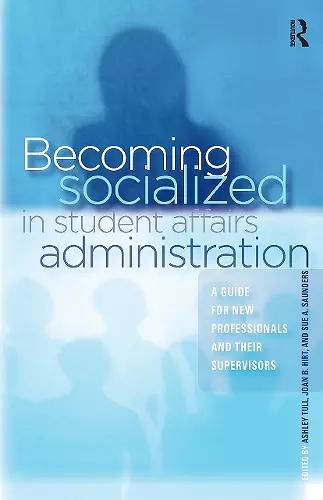Becoming Socialized in Student Affairs Administration
A Guide for New Professionals and Their Supervisors
Joan B Hirt editor Ashley Tull editor Sue Saunders editor
Format:Paperback
Publisher:Taylor & Francis Inc
Published:15th Jun '09
Currently unavailable, and unfortunately no date known when it will be back

Effective socialization of new student affairs professionals is essential—both for the individual success of these practitioners, and for the work of a college or university that promotes student learning. It enables new professionals to manage the important personal and professional transitions they experience throughout their careers, engage in continuous professional development, and achieve high levels of productivity. It also counteracts the high attrition rate among new hires, with all the attendant costs to the institution in terms of resources spent on recruiting, hiring, training, supervising, and developing staff talent.The socialization process for new professionals includes formal and informal elements that influence both success and quality of work life. This process is far more complex than a single orientation program organized by a unit or division. Rather, it is a comprehensive process where both the new professional and organization learn about and from each other in ways that influence working relationships and individual and organizational outcomes.Part I of this book defines the concept, explains its value, and offers a model of socialization. Part II examines the institutional context in which the socialization of new professionals occurs, and describes how different institutional types influence the socialization process. It considers the changing characteristics of college students, and how these impact the work of student affairs.In addressing the extra-institutional and professional contexts, Part III considers the role that graduate education plays in preparing new professionals for work in student affairs, and offers guidance to faculty and practitioners involved in graduate education about what they can do to introduce graduate students to professional life. It addresses the importance of professional orientation activities, the roles of supervision and mentorship, as well as the impact of peers and institutions on the socialization process. It concludes with a discussion of the role and importance of professional associations.This book is intended for graduate program faculty, for senior student affairs officers concerned about developing and retaining the new staff, and for administrators and leaders in student affairs shaping the future of the profession. For new professionals themselves it offers insights on the path to professionalization.
"WIth the stated intent of improving practice, enhancing work life quality, and stemming the attrition of new professionals from student affairs, the authors of this edited text apply socialization theory as an overarching framework and articulate a multifaceted approach to the preparation and transition of new professionals across multiple venues... In Summary, Becoming Socialized in Student Affairs Administration, articulates a common framework that holds significant promise for both improving student affairs practice and enhancing the quality of new professionals work life. When taken as a whole the text achieves its stated goal of illuminating "student affairs administrators of all ranks on the importance of socialization and the role they can play in socializing their new employees."(p. x)"
Journal of College Student Development
"The focus on professional socialization and, in particular, its influence on the retention of new professionals, differentiates this book from the many texts targeted at new professionals in student affairs and their supervisors. This book has a strong empirical grounding, and chapter authors generally are the experts on the topics of their chapters, frequently having conducted research on the topic and drawing on their findings in framing their suggestions... this book offers insights useful to several audiences, and is likely to contribute to the successful integration and retention of new student affairs professionals."
The Review of Higher Education
“The authors use socialization theory as an overarching framework to examine the changing contexts of student affairs across institution types, the students we serve, and key transition issues facing new professionals in the field. The authors describe factors affecting many aspects of socialization including orientation, mentoring, staff-peer relationships, and professional associations. Individual and institutional strategies are provided to assist those entering student affairs, and for graduate preparation program faculty and student affairs practitioners invested in the success of new professionals. An important resource for new professionals."
Marilyn J. Amey, Professor and Chairperson, Department of Educational Administration, Michigan State University
“Becoming Socialized in Student Affairs Administration is a valuable addition to the profession. In this volume, Tull, Hirt, and Saunders have brought together experts on the socialization experiences of new professionals. Graduate students can anticipate their first years on the job, and new professionals will find accurate descriptions of their circumstances and useful insights for adjusting to full-time work. Supervisors and mentors can use Becoming Socialized to construct environments where individual responsibility for professional development can meet workplace expectations and commitments to high quality job performance in service of students.”
Kristen A. Renn, Associate Professor of Higher, Adult, & Lifelong Education, Michigan State University
ISBN: 9781579222765
Dimensions: unknown
Weight: 453g
260 pages